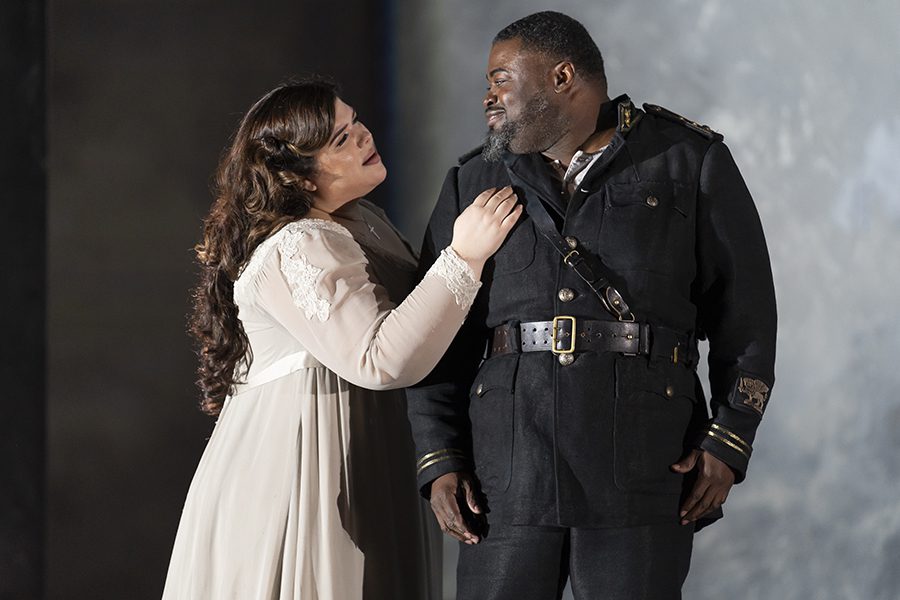Verdi and Mozart at the Kennedy Center
By • November 5, 2019 0 1507

Encountering the two opening offerings of the Washington National Opera season was in some sense a kind of whiplash, coming as they did just as the Washington Nationals were rushing to the climax of their first-ever World Series triumph.
The World Series was duly noted by WNO General Director Timothy O’Leary at the Wednesday-night performance of Verdi’s “Otello,” sung in Italian — after which the Nationals won the title — and referenced at Saturday’s opening-night performance of Mozart’s “The Magic Flute” (a.k.a. “Die Zauberflöte”), sung in English.
The confluence of the two operas, with each other and with the city’s joyous baseball victory and celebration, proved again that the world of opera might not be so elitist or ethereal and even outmoded as some assume. A declamatory aria outburst might on some occasion fit into a seventh-inning stretch, and there may yet be an opera about baseball, but, to date, the Broadway musical “Damn Yankees” (which does have Mephistopheles as a character) will have to suffice.
As far as the productions of “Otello” and “The Magic Flute” are concerned, they couldn’t be more different, except for their roughly approximate running times of three hours. For “Flute,” that might have been a shade too long, but for “Otello,” at least for this critic, it was an enriching three hours that left grief and the pull of emotional power in its wake.
Not that this production of “The Magic Flute” isn’t, well, magical, or entertaining, and full of Mozart’s showy, dexterous and various compositional gifts, along with enchanted places and adventures fit for sage children, adolescents and adults. I suspect that given the opera’s popularity, and its sometimes pushy high-mindedness, it may seem like overly familiar territory.
We are entering the world of European fairy tales here, and quest tales, where heroes and their cohorts are set lofty tasks by mysterious hosts, so that they find themselves and true love and achieve the betterment of mankind. There are dragons and a queen of the night and helpmates and forests and magical creatures and settings, courtesy of artist Maurice Sendak, who knows where the wild things are.
The good prince Tamino (American tenor David Portillo, who sings keenly, with strong feeling), with the mock-heroic company of Papageno, the bird-hunter (a resounding show of comic and human splendor by baritone Michael Adams), sets out to do qualifying deeds and win the love of his life, the winning and touching Pamina, a role that soprano Sydney Mancasola sings beautifully, with a tender passion, especially when she thinks she’s lost her swain forever.
The Queen of the Night is powerfully and with gusto performed and sung by soprano Kathryn Lewek, who navigates all the musical difficulties — the thrilling trills, twirls and leaps — assigned to her.
To me, Adams’s Papageno seems the most grounded character. He’s us, down to his urgent quest to eat, drink and find a life’s companion. He reminds us that opera is also, well, for real.
In Verdi’s opera of jealousy run amok, it’s a question of “Otello” and “Othello,” that juncture where opera has often met Shakespeare. (See Washington Concert Opera’s production of Ambroise Thomas’s “Hamlet” on Nov. 24.)
What’s surprising to this critic is what this production of “Otello,” with a libretto by Arrigo Boito, does with and to “Othello.” It’s more of an embellished, enriched marriage than a difference in form and genre. It has everything to do with the power of the music, of course, but also the central characters of Otello, the Moor warrior prince who saves Venice; Desdemona, his aristocratic Venetian wife; and Iago, the scheming, callous, almost nihilistic lieutenant and friend to Otello, who schemes his destruction and annihilation.
Somehow, these three, while following Shakespeare’s plot, round it out in their finest moments, especially Georgian baritone George Gagnidze as Iago, who renders his nihilistic “Credo” with such vehemence and violence that it clarifies the character beyond merely, in Shakespeare’s words, that “I hate the Moor.”
Soprano Leah Crocetto, a sometimes insistent innocent, is faced with the rage of her husband’s incomprehensible jealousy, it’s final pitiless aspect, with a heartbreaking “Willow” song and “Ave Maria.”
Yet, it is Otello (or Othello) who touches the audience the most with his dying breath and words: “And yet another kiss.”
For African American tenor Russell Thomas, the weight comes in carrying the whole, the character, throughout. While Otello has the size as a character, he’s also difficult in the sense of succumbing to jealousy so easily and so insistently and so tragically.
“He’s difficult for anybody,” says Thomas, who’s performed the role before. “He’s a mixed bag. He’s temperamental, he’s natural. He is truly dramatic, but he’s never just a barker, or a shouter. There’s human nuance, there.
“The tragedy isn’t just about Desdemona and jealousy, there’s also that degree of friendship with Iago, the trust … He calls him ‘honest Iago.’ They have a shared camaraderie.”
That comes through in Verdi’s “Otello” by way of Thomas. There are shadings here; his voice operates at a somewhat higher level.
Thomas sees the affinities between theater, especially Shakespeare, and opera. “Opera is by nature over the top, and the same time it’s the most holistic of art forms. Shakespeare, to me, seems operatic, too. It’s magical, to me, that you can tell a story and create characters with your voice, with music.”
In this way, Verdi — and Ambroise Thomas and the rest — had something to add to Shakespeare’s “Othello.” They fill and fulfill it with music, giving the role another layer that isn’t always obvious or in plain sight.
Remaining performances of “Otello” are on Nov. 8, 11 and 16. “The Magic Flute” will be performed on Nov. 9, 12, 15, 17, 22 and 23. Both are in the Kennedy Center Opera House. For tickets, visit kennedy-center.org or call 202-467-4600.

